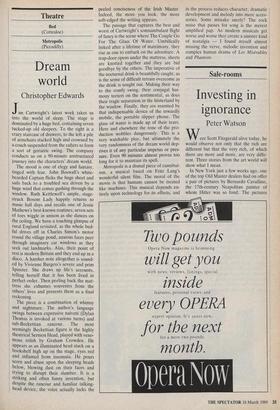Theatre
Bed (Cottesloe) Metropolis (Piccadilly)
Dream world
Christopher Edwards
Jim Cartwright's latest work takes us into the world of sleep. The stage is dominated by a huge bed, containing seven tucked-up old sleepers. To the right is a crazy staircase of drawers, to the left a pile of armchairs stacked high and crowned by a couch suspended from the rafters to form a sort of geriatric swing. The company conducts us on a 90-minute unstructured journey into the characters' dream world.
The mood is one of elegy and fantasy, tinged with fear. John Boswall's white- bearded Captain flicks the huge sheet and sails back to a troubled sea driven by a huge wind that comes gushing through the window. Ruth Kettlewell's ample, stage- struck Bosom Lady happily returns to music hall days and recalls one of Jessie Mathews's best-known routines; seven sets of toes wiggle in unison as she dances on the ceiling. We have a touching glimpse of rural England revisited, as the whole bed- ful drives off in Charles Simon's motor round the village pond, anxious faces peer through imaginary car windows as they seek out landmarks. Alas, their point of rest is modern Britain and they end up in a disco. A harsher note altogether is sound- ed by Vivienne Burgess's severe and prim Spinster. She draws up life's accounts, telling herself that it has been lived in perfect order. Then peeling back the mat- tress she exhumes souvenirs from the others' lives and presents them as a final reckoning.
The piece is a combination of whimsy and nightmare. The author's language swings between expressive naiveté (Dylan Thomas is invoked at various turns) and sub-Beckettian rancour. The most seemingly Beckettian figure is the highly theatrical Sermon Head, played with veno- mous relish by Graham Crowden. He appears as an illuminated head stuck on a bookshelf high up on the stage, eyes red and inflamed from insomnia. He pours scorn and abuse upon the sleeping heads below, blowing dust on their faces and trying to disrupt their slumber. It is a striking and often funny invention, but despite the rancour and familiar talking- head device, the voice actually lacks the peeled conciseness of the Irish Master. Indeed, the more you look, the more soft-edged the writing appears.
The passage that captures the best and worst of Cartwright's somnambulant flight of fancy is the scene where The Couple Go For The Glass Of Water. Umbilically linked after a lifetime of matrimony, they rise as one to embark on the adventure. A trap-door opens under the mattress, sheets are knotted together and they are bid goodbye by the others. The imperative of the nocturnal drink is beautifully caught, as is the sense of difficult terrain overcome as the drink is sought out. Making their way to the comfy swing, their conjugal har- mony teeters on the sentimental, as does their tragic separation in the hinterland by the window. Finally, they are reunited by that indispensable device of the inwardly mobile, the portable slipper phone. The glass of water is made up of their tears. Here and elsewhere the tone of the pro- duction wobbles dangerously. This is a very watchable play, but ultimately the very randomness of the dream world dep- rives it of any particular impetus or pres- sure. Even 90 minutes almost proves too long for it to maintain its spell.
Metropolis is a dismal piece of cannibal- ism, a musical based on Fritz Lang's wonderful silent film. The moral of the movie is that humans cannot be treated like machines. This musical depends en- tirely upon technology for its effects, and in the process reduces character, dramatic development and melody into mere acces- sories. Some mistake surely? The rock noise that passes for song is the merest amplified pap. As modern musicals get worse and worse they create a sinister kind of nostalgia — I found myself almost missing the verve, melodic invention and complex human drama of Les Miserables and Phantom.


























































 Previous page
Previous page